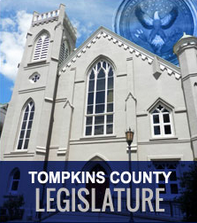After hours of discussion at the June 16th county legislative meeting, the vote on the fate of the Old Library ended in a stalemate of 6 in favor of a large apartment complex for seniors (TravisHyde), and 6 in favor of a smaller adaptive reuse condo project (Franklin Properties) which had hundreds of petition supporters and inspired dozens of citizens to show up and speak in favor of the Franklin proposal.
The vote was pretty much split along geographic lines with those representing the urban/suburban core of the county (Chock, Shinagawa, McBean-Clairborne, Burbank, Kiefer) backing the project that had widespread neighborhood support (along with Klein from Caroline/Danby). Those supporting the large 63-unit apartment complex came from the more rural parts of the county (Dryden, Groton, Lansing, Ulysses, Enfield/Newfield). These rural reps stressed the need for adding housing to try and relieve the incessant demand that has driven up the price of shelter. Residents of the historic DeWitt neighborhood around the old library spoke strongly about the importance of adding density appropriate to the scale and character of the location, and pointed to other
building sites in planned growth areas where the TravisHyde or other projects would be less problematic.
Our community needs to have a thorough discussion about densification, the treadmill of constant growth, carrying capacity, and how to distribute costs and benefits as we add people to our community. But first we should take a look at the question of who decides.
 Legislator Shinagawa brought up the need for elected representatives to balance the role of Delegate (do what your constituents ask) vs. Trustee (be guided by your own knowledge, experience, and values). Legislator Robertson emphasized the trustee role, believing many of the citizens speaking out were misinformed on the merits of the projects, and that the county legislature had a responsibility for the greater good of adding 63 vs. 28 housing units on the site. Others like Legislator Klein spoke to the overwhelming preference of the people who would be most affected by the project – the neighbors.
Legislator Shinagawa brought up the need for elected representatives to balance the role of Delegate (do what your constituents ask) vs. Trustee (be guided by your own knowledge, experience, and values). Legislator Robertson emphasized the trustee role, believing many of the citizens speaking out were misinformed on the merits of the projects, and that the county legislature had a responsibility for the greater good of adding 63 vs. 28 housing units on the site. Others like Legislator Klein spoke to the overwhelming preference of the people who would be most affected by the project – the neighbors.
This raises another realm ripe for public dialogue. When Dryden led the county in the push for a ban on fracking, the principle of home rule was core to their case. Gas drilling advocates accused anti-fracking activists of being NIMBYs (Not In My BackYard) and selfishly preventing economic gain for the greater good of the Southern Tier. Activists responded that they would prefer to keep the risks of fracking out of everyone’s backyard and vigorously pursue a clean energy future for the greater good – but that at the very least the concept of local control should allow them to choose their own future.
Few people like the idea of their neighborhood being made a sacrifice zone for the economic benefit of others. Robertson mentioned the ongoing and projected growth rate for Cornell, which will require finding housing for about 200 people every year. But people in the DeWitt Park historic district don’t see why their neighborhood should make sacrifices to address Cornell’s or other employers’ expansion plans. They are willing to accept more density, but want a voice in how much and what kind and to whose benefit.
We need to have a deeper discussion about rates of growth and limits to growth and what endpoint we have in mind for ourselves. We are in an era where many people are demanding more transparency and democratic control of the public realm. The trustee form of government is often seen as easily corrupted by special interests and as a source of the “business-as-usual” mindset that continues to exacerbate our twin problems of inequality and climate disruption. The trustee role doesn’t work without trust.
But the delegate role doesn’t work without an informed and engaged populace. Right now, it is clear that the Ithaca area has relatively high rates of engagement on local issues. And it was telling that our county’s most experienced and knowledgeable urban planners and smart growth advocates came out to speak in support of the Franklin project.
We urge the county reps from our rural towns to think about this issue of home rule vs. the “greater good.” Americans of all political persuasions are often suspicious when officials cite the Common Good when they face grassroots opposition. It’s a tricky topic because of our nation’s history of oppression or exploitation by local majorities. And NIMBYism does occur. That’s why we have to work together to define the greater good and agree on the specifics of how to work toward it. We have a housing problem, and we need to think about rates and densities and endpoints if we are to avoid degrading the quality of life so many have worked to create.
The path to a more sustainable community is going to be very hard work and it must be done together collaboratively, with humility, and through much trust building. Listening to the people on the Franklin project will be a very good place for the county legislature to build trust for the conversations ahead on equity, energy, and the economy.







